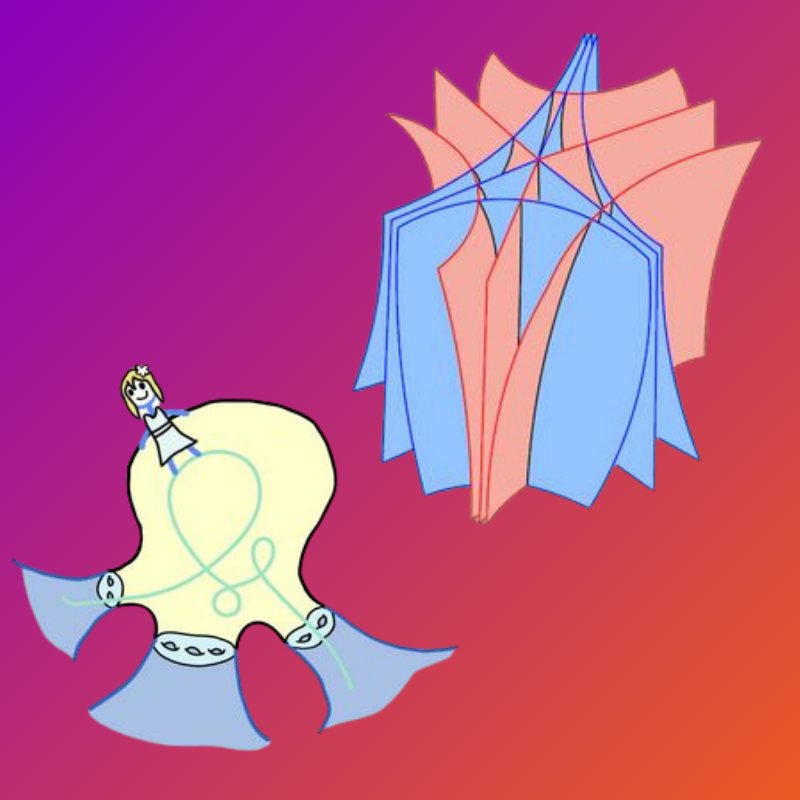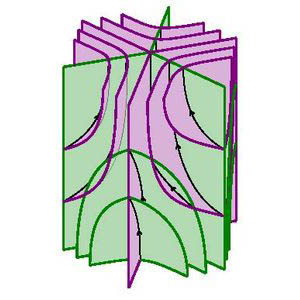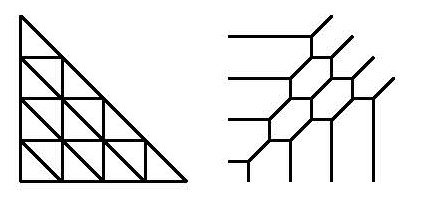-
Pathways Workshop: Topological and Geometric Structures in Low Dimensions & Geometry and Dynamics for Discrete Subgroups of Higher Rank Lie Groups
Organizers: Martin Bridgeman (Boston College), Lei Chen (University of Chicago; University of Maryland), Beibei Liu (Ohio State University), Maria Beatrice Pozzetti (Università di Bologna), Rachel Roberts (Washington University in St. Louis), Jing Tao (University of Oklahoma)
This workshop features a series of invited talks by experts across the fields of low-dimensional topology, homogeneous dynamics, and the geometry of symmetric spaces. Spanning all career stages, the event aims to foster a collaborative and supportive environment, particularly for early-career mathematicians, encouraging engagement, learning, and exploration in a welcoming academic setting.
Updated on Jun 10, 2025 11:05 AM PDT -
Introductory Workshop: Topological and Geometric Structures in Low Dimensions & Geometry and Dynamics for Discrete Subgroups of Higher Rank Lie Groups
Organizers: Federica Fanoni (Université Paris-Est Créteil Val-de-Marne), Steven Frankel (Washington University), LEAD Yair Minsky (Yale University), Amir Mohammadi (University of California, Berkeley), Andrés Sambarino (Université de Paris VII (Denis Diderot) et Université de Paris VI (Pierre et Marie Curie)), Barbara Schapira (Université de Picardie (Jules Verne)), Genevieve Walsh (Tufts University)
The joint introductory workshop for the programs in Geometry and Dynamics for Discrete Subgroups of Higher Rank Lie Groups and Topological and Geometric Structures in Low Dimensions will feature lectures introducing subjects of interest to both programs, including Teichmuller Theory, geometry in higher rank, foliations and flows, Anosov groups and thermodynamic formalism, mapping class groups, counting and equidistribution, and related topics. Minicourses will be targeted at early career researchers as well as specialists looking to find connections between the different subjects.
Updated on Jul 23, 2024 02:18 PM PDT -
Recent Progress in Topological and Geometric Structures in Low Dimensions
Organizers: Kenneth Bromberg (University of Utah), Sergio Fenley (Florida State University), Autumn Kent (University of Wisconsin-Madison), LEAD Kathryn Mann (Cornell University), Kasra Rafi (University of Toronto) Foliations around a pseudo-Anosov singularity (Image credit: Chi Cheuk Tsang)
Foliations around a pseudo-Anosov singularity (Image credit: Chi Cheuk Tsang)This workshop will bring together ideas from diverse areas of mathematics that meet in the setting of geometry and topology in low dimensions. This includes the study of flows, foliations, and fibrations of three-manifolds and the related study of geometry (e.g. hyperbolic or conformal structures) of the manifolds and of the leaves or fibers, and their mapping class groups. This is a rich and interconnected area and many adjacent topics will also be featured.
Updated on Nov 24, 2025 03:54 PM PST -
Hot Topics: Geometric Langlands Conjecture
Organizers: Justin Campbell (Brandeis University), Charlotte Chan (University of Michigan), Lin Chen (Tsinghua University), Kevin Lin (University of Chicago), Sergey Lysenko (Université de Lorraine), Will Sawin (Princeton University) The Langlands program, pictured as a sea monster (Photo credit: V. Lafforgue)
The Langlands program, pictured as a sea monster (Photo credit: V. Lafforgue)This workshop will focus on the recent proof of the global unramified geometric Langlands conjecture as well as potential future developments in this field.
Updated on Dec 09, 2025 10:25 AM PST -
Homogeneous Dynamics and Anosov Representations
Organizers: Simion Filip (University of Chicago), Ursula Hamenstädt (Rheinische Friedrich-Wilhelms-Universität Bonn), LEAD Fanny Kassel (Institut des Hautes Études Scientifiques (IHES)), Hee Oh (Yale University), Jean-François Quint (CNRS - Université de Montpellier) Limit set of an Anosov representation
Limit set of an Anosov representationThis workshop will focus on recent advances on geometric and dynamical approaches to the study of discrete subgroups of higher rank Lie groups and their deformation spaces. The goal will be to present results and exchange ideas from different areas of mathematics, and we hope to create bonds between several different mathematical communities.
Updated on Jul 15, 2025 10:47 AM PDT -
Critical Issues in Mathematics Education 2026: Math Literacy for 21st Century Citizenship - Part II
Organizers: Robert Berry (Indiana University), Josue Cordones (Bronx Collaborative High School), Megan Franke (University of California, Los Angeles), Maisie Gholson (University of Michigan), Courtney Ginsberg (Math for America), Mark Hoover (University of Michigan), Yvonne Lai (University of Nebraska), LEAD Maisha Moses (The Young People's Project), LEAD Benjamin Moynihan (The Algebra Project, Inc.), Aris Winger (Georgia Gwinnett College)Building on the vision Bob Moses set out in the 1993 Algebra Initiative Colloquium, the 2025 Critical Issues in Mathematics Education (CIME) Workshop celebrated the legacy of Moses’ call for a mathematics literacy that supports citizenship in the 21st century. A mathematics towards citizenship has proved elusive as a goal for mathematicians, mathematics educators, researchers, students, teachers, and leaders—even as efforts among different individuals, organizations, and communities labor for greater access to high-quality mathematics learning experiences. The 2026 CIME Workshop, Math Literacy for 21st Century Citizenship - Part II, endeavors to design opportunities for learning, collaborating, and struggling towards a mathematics for lived citizenship, as a theme and organizing principle for communities across the Nation.
For Moses, the notion of lived citizenship is not simply a matter of gaining legal status but of demanding that the legal status be meaningful. Thus mathematics literacy for lived or participatory citizenship might be thought of to include contributing to your community, not just being part of a community, and beyond belonging, to actively participate in making your community better, in making life better for others.
The conception of mathematics for lived citizenship is an important foundation for the goals for the 2026 CIME Workshop, in order to envision the development of coordinated actions in the short and long term within the mathematics and mathematics education communities. To ground and catalyze these efforts, we invite participants to consider a mathematics for lived citizenship through three foundational ideas:
- Claiming mathematics -- establishing agency in and ownership of math.
- Building Agency -- claiming and leveraging mathematics knowledge to overcome present day, generational, community, and national challenges.
- Collaboration and collective effort -- using mathematics literacy to make systemic change.
Three questions will guide our work:
- How does the unfolding history of mathematics impact lived citizenship?
- How do we understand the relationship between mathematical flourishing and the evolution of vibrant democracy in the United States?
- In light of the above two questions, how do we reimagine our roles, responsibilities, and actions in the short and long term?
Updated on Nov 05, 2025 11:33 AM PST -
Pathways Workshop: Representation Theory Under the Influence of Quantum Field Theory & Motivic Homotopy Theory
Organizers: Ana Balibanu (Louisiana State University), Asilata Bapat (Australian National University), Teena Gerhardt (Michigan State University), Iva Halacheva (Northeastern University), Padmavathi Srinivasan (Boston University), Kirsten Wickelgren (Duke University)Updated on Jun 10, 2025 11:08 AM PDT -
Introductory Workshop: Representation Theory Under the Influence of Quantum Field Theory & Motivic Homotopy Theory
Organizers: David Ben-Zvi (University of Texas, Austin), Elden Elmanto (University of Toronto, Scarborough), Iva Halacheva (Northeastern University), Pavel Safronov (University of Edinburgh), Anand Sawant (Tata Institute of Fundamental Research), Peng Shan (Tsinghua University), Craig Westerland (University of Minnesota Twin Cities), Maria Yakerson (Institut de Mathématiques de Jussieu)Updated on Jun 10, 2025 11:07 AM PDT -
Geometric Representation Theory and 3d Mirror Symmetry
Organizers: Tudor Dimofte (University of Edinburgh), Joel Kamnitzer (University of Toronto), Sam Raskin (University of Texas, Austin), Peng Shan (Tsinghua University), LEAD Benjamin Webster (University of Waterloo) Image by Elliot Kienzle
Image by Elliot KienzleThis workshop will bring together theoretical physicists, representation theorists, algebraic geometers and symplectic geometers interested the connections between quantum field theory and geometric representation theory. The main topics to be discussed are mathematical aspects of 2d, 3d and 4d supersymmetric field theories, such as: topological twists and the resulting Higgs and Coulomb branches, relations to quantization and categorification, representations of vertex operator algebras, connections to enumerative geometry and quantum K-theory and elliptic cohomology, relations to knot homology and, finally, connections to the (relative) geometric Langlands program.
Updated on Jul 15, 2025 04:27 PM PDT -
Motivic homotopy theory: connections and applications
Organizers: Adrien Dubouloz (Institut de Mathématiques de Bourgogne), LEAD Dan Isaksen (Wayne State University), Sabrina Pauli (Technische Universitat Darmstadt)The workshop will bring together researchers at the forefront of ongoing work in motivic homotopy theory. Topics will include the application of motivic techniques to: geometry of affine algebraic varieties and algebraic vector bundles; computations in classical algebraic topology such as homotopy groups of spheres; and enumerative geometry. The workshop will also consider the internal foundational development of motivic homotopy theory itself.
Created on Oct 09, 2025 10:20 AM PDT -
Pathways Workshop: Algebraic Combinatorics & New Trends in Tropical Geometry
Organizers: Renzo Cavalieri (Colorado State University), Sylvie Corteel (Université de Paris VII (Denis Diderot); University of California, Berkeley), Olya Mandelshtam (University of Waterloo), LEAD Hannah Markwig (Eberhard-Karls-Universität Tübingen), Sarah Mason (Wake Forest University), Kris Shaw (University of Oslo)
This workshop presents introductory talks and new trends in tropical geometry and algebraic combinatorics, including interactions between tropical geometry and enumerative, logarithmic, nonarchimedean, and real algebraic geometry, mirror symmetry and symplectic geometry, moduli spaces in tropical geometry, the geometry of matroids, integrable systems and dynamical combinatorics, combinatorial representation theory, geometry of polynomials, combinatorial varieties and connections to symmetric function theory and cluster algebras.
Updated on Nov 13, 2025 12:23 PM PST -
Introductory Workshop: Algebraic Combinatorics & New Trends in Tropical Geometry
Organizers: Philippe Di Francesco (University of Illinois at Urbana-Champaign), Ilia Itenberg (Institut de Mathématiques de Jussieu - Paris Rive Gauche), Svante Linusson (Royal Institute of Technology), Sam Payne (University of Texas, Austin), Colleen Robichaux (University of California, Los Angeles), Kris Shaw (University of Oslo), Lauren Williams (Harvard University), Josephine Yu (Georgia Institute of Technology)Updated on Nov 13, 2025 12:29 PM PST
|
|
All upcoming workshops |
